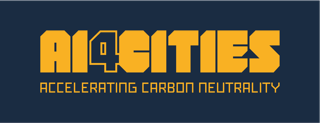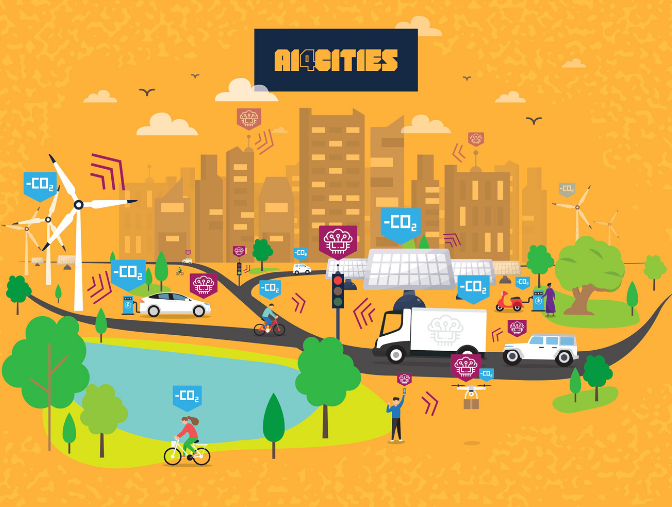AI4Cities brought together the leading European cities in the intersection of smart cities and GHG emissions reduction, in order to speed up and steer the creation of new breakthrough solutions in how AI will support cities’ climate action commitments.
AI4Cities combined the City partners’ unique knowledge, tools and vibrant ecosystems, with a challenge-based PCP competition on developing unique innovative Digital solutions able to help Cities reduce their GHG emissions. AI4Cities challenges were built on highly innovate and not market-ready technologies, to be applied in difficult contexts.
The purpose of this AI4Cities Pre-Commercial Procurement (PCP) was to support Cities’ transition to carbon neutrality, by applying the use of Artificial Intelligence (AI) and related enabling digital technologies to tackle the challenge of reducing the Cities’ GHG emissions.
Starting in 2020, it was time to direct AI research/innovation towards societal needs – to task AI developers with detailed, pragmatic, solvable missions from the cities’ climate action plans. Partner cities are all committed to becoming carbon neutral.
Copenhagen is a world leader with the ambition of becoming Carbon neutral by 2025. Helsinki also has one of the most ambitious targets, being committed to become Carbon neutral by 2035. The strategies of both the region of Paris and the City of Tallinn have the goal to achieve carbon neutrality by 2050, and Amsterdam wants to cut its carbon emissions by 95 percent by 2050. The City of Stavanger aims to reduce its GHG emissions by 80 percent by 2030, and to be fossil free by 2040.
In this proposal, the concept of AI was also seen as an umbrella, collecting best practises of platforms in order to work efficiently. An urban platform which supports cities with their smart city services is a somewhat abstract concept that is hardly ever a single server or even a platform. The urban platform is a collection of smart city-related data and services that interconnect with harmonised API’s, data models and controlled vocabularies. A solid data platform is thus the basis of any AI service. All the partner cities in the project have years of experience on sharing data and improving data interoperability.
Implementation plan
PCP – Pre-commercial procurement
The PCP process and outcomes include:
-Results of the OMC will be taken into account to fine-tune the tender specifications.
-The PCP contract notice will published EU-wide in at least English.
-All offers will be evaluated according to the same objective criteria.
-The prior information notice for the open market consultation will be published and the PCP contract notice will be written in accordance with EC guidelines and will be promoted and advertised widely.
-The PCP call for tender will remain open for at least 90 days.
-The PCP process will take care to avoid any conflict of interests.
-R&D providers generating results in PCP will own the attached IPRs.
-The procurers will enjoy royalty-free access rights to use the R&D results for their own use.
-The PCP contract with each selected tenderer will take the form of one single framework agreement covering all PCP phases.
More detailed information about PCP is available on Commission’s site.

Benefits for Procuring City
-Steer development of solutions towards concrete public sector needs
-Enables a focus on the critical R&D phase before actual commercialisation
-Input from different suppliers who compete using grants for different phases of development
-Risks and benefits are shared between procurers and suppliers under market conditions
Benefits for Supplier
-Better preparation to address the future market through early collaboration with public authorities
-Lower investment to generate new market opportunities due to financial support from the public side
-Potential new opportunities unlocked through collaboration/competition with other suppliers
-A focus on the core tasks of R&D with the public sector supporting the creation of a new market
Seven piloted solutions
MarshallAI consortium (Ix3)
Smart Intersections
Video
White paper
Vianova consortium (MPAT Tool)
MaaS – Shared mobility
Video
White paper
Nommon consortium (Avenue)
MaaS – Shared mobility
Video
White paper
BEE – Building Energy Efficiency consortium
Smart Systems balancing energy supply
Video
White paper
Spike
Smart Systems balancing energy supply
Video
White paper
C.in-City consortium
Emission monitoring
Video
White paper
Holoni consortium
Energy Platforms/Market Place
Video
White paper
Partners, budget and duration
- Forum Virium Helsinki coordinated the project.
- Project partners were Forum Virium Helsinki Ltd, Gemeente Amsterdam, Cap Digital, Kobenhavns kommune, Tallinna Linn, Stavanger kommune, and ICLEI European Secretariat GMBH
- Project duration: 36 months, starting date 1st of January 2020.
- Budget: 6 666 533 euros, from which PCP procurement budget for companies 4 666 630 euros.
- Preferred Partners’ for future solutions uptake and promotion are: Municipality of Barcelona, and BIT Habitat in Spain, Municipality of Budapest in Hungary, Municipality of Egaleo in Greece, Municipality of Istanbul in Turkey, Municipality of Lamia in Greece, Municipality of Milan in Italy, Municipality of Porto in Portugal, Eurocities (European network of Cities), and Open & Agile Smart Cities (International network of Smart Cities).



